Project Management Methodologies: PMBOK, PRINCE2, Agile & Waterfall
VerifiedAdded on 2023/06/08
|5
|1125
|97
Essay
AI Summary
This essay provides a comprehensive overview of various project management methodologies, including PMBOK, PRINCE2, SDLC, Waterfall, and Agile. It defines methodology and its role in project management, highlighting how it helps in systematic project handling. The essay compares and contrasts Waterfall and Agile methodologies, emphasizing their different approaches to project requirements and delivery. It also explains how PRINCE2 and PMBOK methodologies relate to the project lifecycle, detailing their respective phases and processes. The document concludes with references to support the information presented, offering a detailed understanding of project management methodologies and their practical applications.
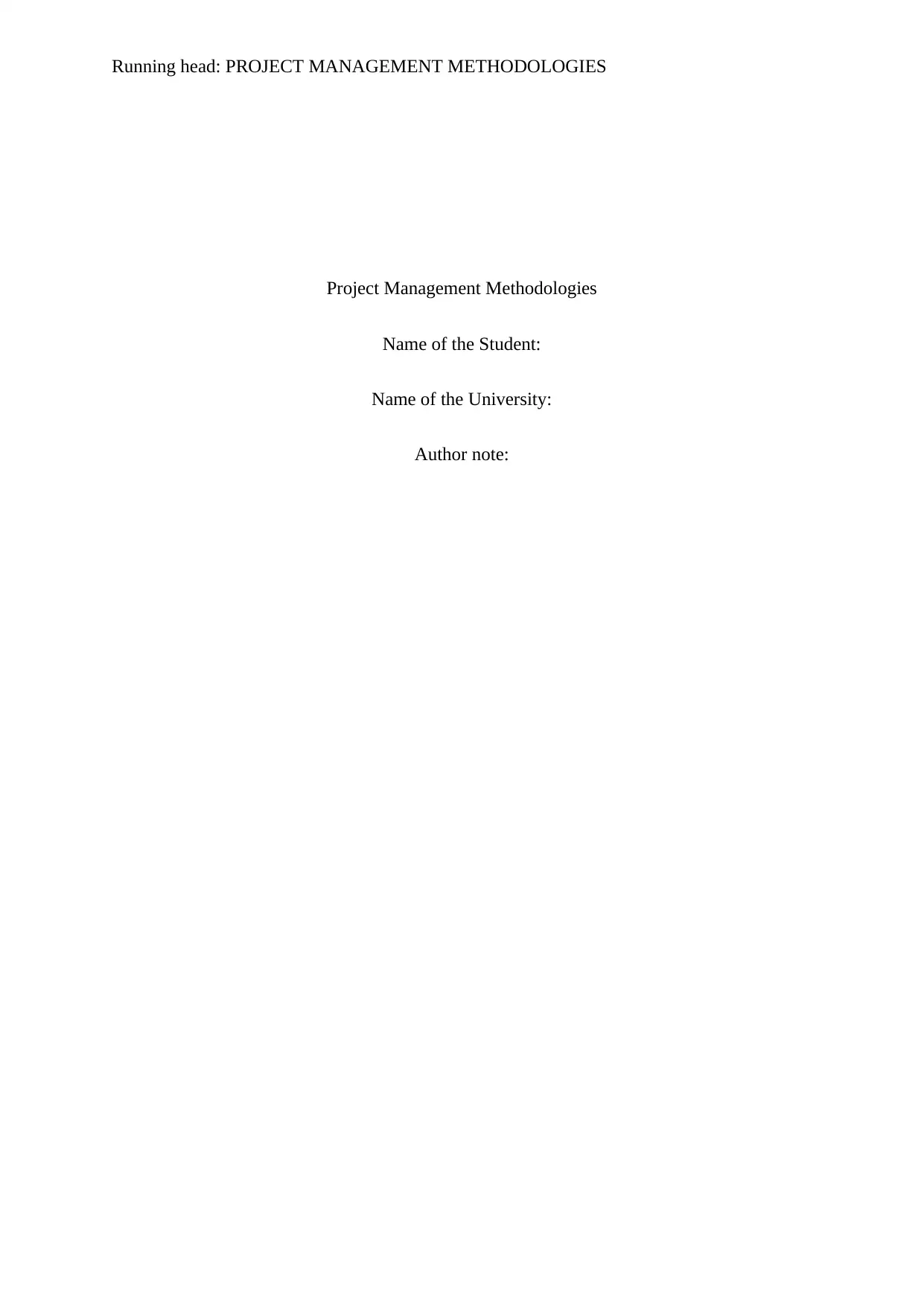
Running head: PROJECT MANAGEMENT METHODOLOGIES
Project Management Methodologies
Name of the Student:
Name of the University:
Author note:
Project Management Methodologies
Name of the Student:
Name of the University:
Author note:
Paraphrase This Document
Need a fresh take? Get an instant paraphrase of this document with our AI Paraphraser
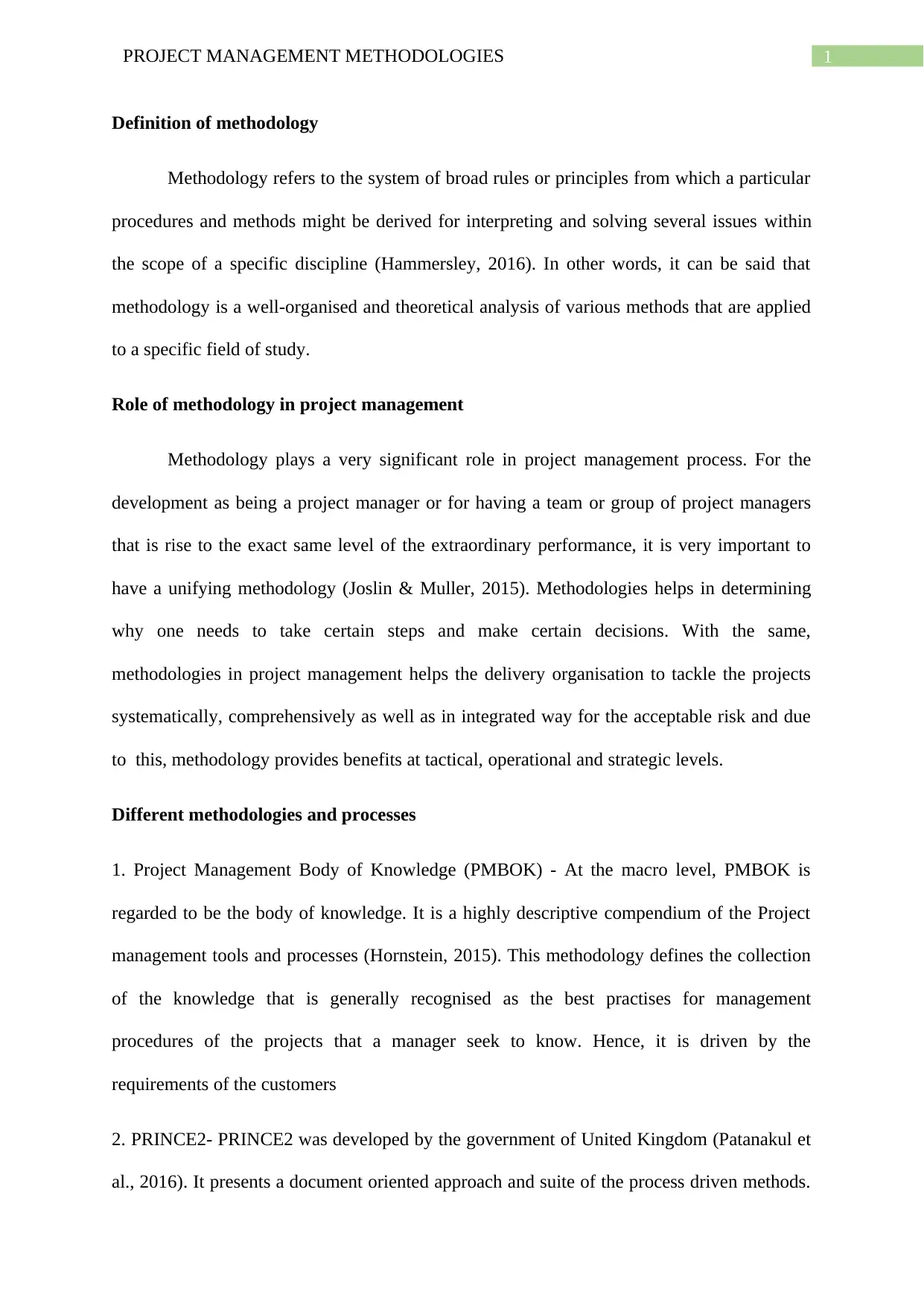
1PROJECT MANAGEMENT METHODOLOGIES
Definition of methodology
Methodology refers to the system of broad rules or principles from which a particular
procedures and methods might be derived for interpreting and solving several issues within
the scope of a specific discipline (Hammersley, 2016). In other words, it can be said that
methodology is a well-organised and theoretical analysis of various methods that are applied
to a specific field of study.
Role of methodology in project management
Methodology plays a very significant role in project management process. For the
development as being a project manager or for having a team or group of project managers
that is rise to the exact same level of the extraordinary performance, it is very important to
have a unifying methodology (Joslin & Muller, 2015). Methodologies helps in determining
why one needs to take certain steps and make certain decisions. With the same,
methodologies in project management helps the delivery organisation to tackle the projects
systematically, comprehensively as well as in integrated way for the acceptable risk and due
to this, methodology provides benefits at tactical, operational and strategic levels.
Different methodologies and processes
1. Project Management Body of Knowledge (PMBOK) - At the macro level, PMBOK is
regarded to be the body of knowledge. It is a highly descriptive compendium of the Project
management tools and processes (Hornstein, 2015). This methodology defines the collection
of the knowledge that is generally recognised as the best practises for management
procedures of the projects that a manager seek to know. Hence, it is driven by the
requirements of the customers
2. PRINCE2- PRINCE2 was developed by the government of United Kingdom (Patanakul et
al., 2016). It presents a document oriented approach and suite of the process driven methods.
Definition of methodology
Methodology refers to the system of broad rules or principles from which a particular
procedures and methods might be derived for interpreting and solving several issues within
the scope of a specific discipline (Hammersley, 2016). In other words, it can be said that
methodology is a well-organised and theoretical analysis of various methods that are applied
to a specific field of study.
Role of methodology in project management
Methodology plays a very significant role in project management process. For the
development as being a project manager or for having a team or group of project managers
that is rise to the exact same level of the extraordinary performance, it is very important to
have a unifying methodology (Joslin & Muller, 2015). Methodologies helps in determining
why one needs to take certain steps and make certain decisions. With the same,
methodologies in project management helps the delivery organisation to tackle the projects
systematically, comprehensively as well as in integrated way for the acceptable risk and due
to this, methodology provides benefits at tactical, operational and strategic levels.
Different methodologies and processes
1. Project Management Body of Knowledge (PMBOK) - At the macro level, PMBOK is
regarded to be the body of knowledge. It is a highly descriptive compendium of the Project
management tools and processes (Hornstein, 2015). This methodology defines the collection
of the knowledge that is generally recognised as the best practises for management
procedures of the projects that a manager seek to know. Hence, it is driven by the
requirements of the customers
2. PRINCE2- PRINCE2 was developed by the government of United Kingdom (Patanakul et
al., 2016). It presents a document oriented approach and suite of the process driven methods.
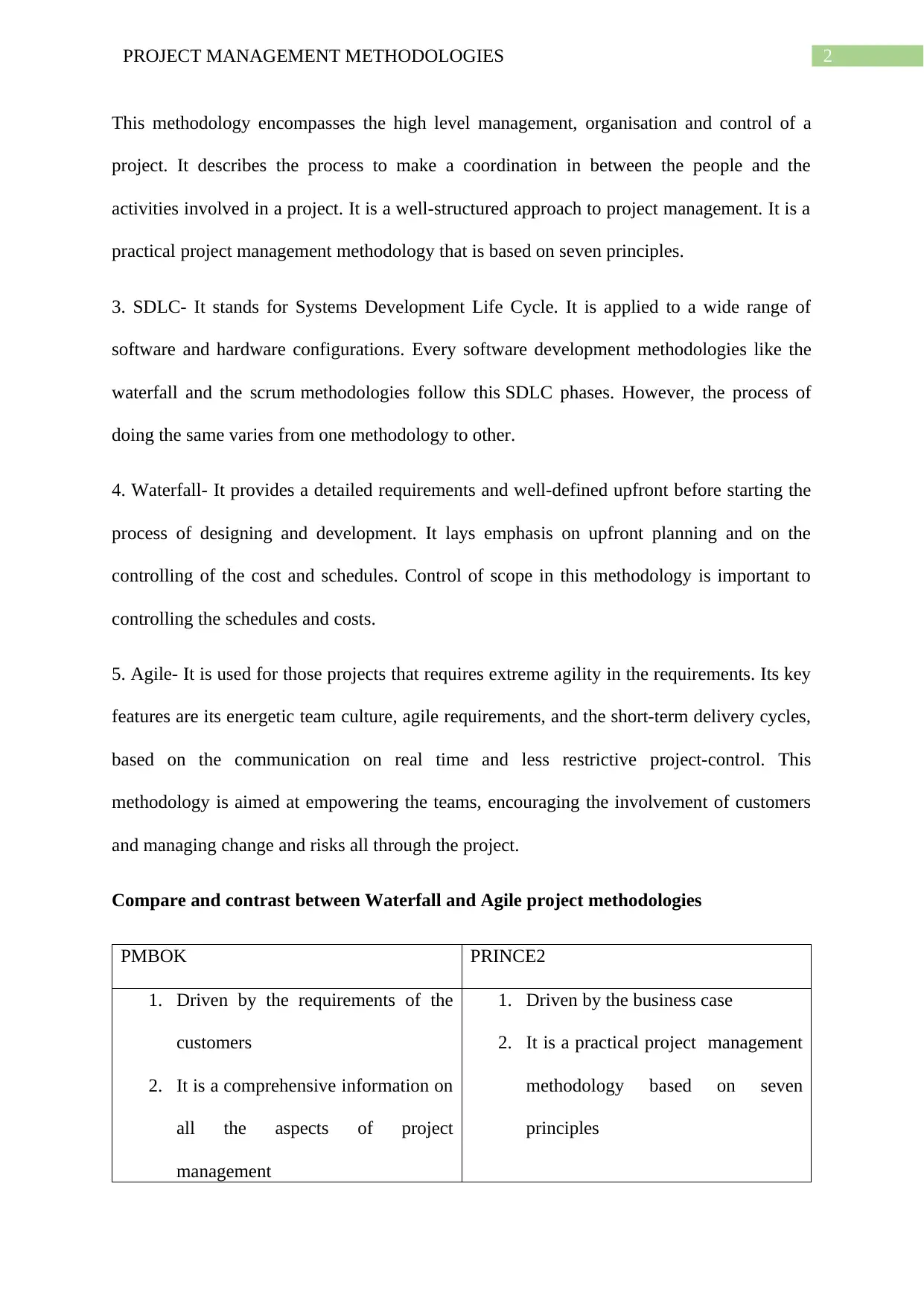
2PROJECT MANAGEMENT METHODOLOGIES
This methodology encompasses the high level management, organisation and control of a
project. It describes the process to make a coordination in between the people and the
activities involved in a project. It is a well-structured approach to project management. It is a
practical project management methodology that is based on seven principles.
3. SDLC- It stands for Systems Development Life Cycle. It is applied to a wide range of
software and hardware configurations. Every software development methodologies like the
waterfall and the scrum methodologies follow this SDLC phases. However, the process of
doing the same varies from one methodology to other.
4. Waterfall- It provides a detailed requirements and well-defined upfront before starting the
process of designing and development. It lays emphasis on upfront planning and on the
controlling of the cost and schedules. Control of scope in this methodology is important to
controlling the schedules and costs.
5. Agile- It is used for those projects that requires extreme agility in the requirements. Its key
features are its energetic team culture, agile requirements, and the short-term delivery cycles,
based on the communication on real time and less restrictive project-control. This
methodology is aimed at empowering the teams, encouraging the involvement of customers
and managing change and risks all through the project.
Compare and contrast between Waterfall and Agile project methodologies
PMBOK PRINCE2
1. Driven by the requirements of the
customers
2. It is a comprehensive information on
all the aspects of project
management
1. Driven by the business case
2. It is a practical project management
methodology based on seven
principles
This methodology encompasses the high level management, organisation and control of a
project. It describes the process to make a coordination in between the people and the
activities involved in a project. It is a well-structured approach to project management. It is a
practical project management methodology that is based on seven principles.
3. SDLC- It stands for Systems Development Life Cycle. It is applied to a wide range of
software and hardware configurations. Every software development methodologies like the
waterfall and the scrum methodologies follow this SDLC phases. However, the process of
doing the same varies from one methodology to other.
4. Waterfall- It provides a detailed requirements and well-defined upfront before starting the
process of designing and development. It lays emphasis on upfront planning and on the
controlling of the cost and schedules. Control of scope in this methodology is important to
controlling the schedules and costs.
5. Agile- It is used for those projects that requires extreme agility in the requirements. Its key
features are its energetic team culture, agile requirements, and the short-term delivery cycles,
based on the communication on real time and less restrictive project-control. This
methodology is aimed at empowering the teams, encouraging the involvement of customers
and managing change and risks all through the project.
Compare and contrast between Waterfall and Agile project methodologies
PMBOK PRINCE2
1. Driven by the requirements of the
customers
2. It is a comprehensive information on
all the aspects of project
management
1. Driven by the business case
2. It is a practical project management
methodology based on seven
principles
⊘ This is a preview!⊘
Do you want full access?
Subscribe today to unlock all pages.

Trusted by 1+ million students worldwide
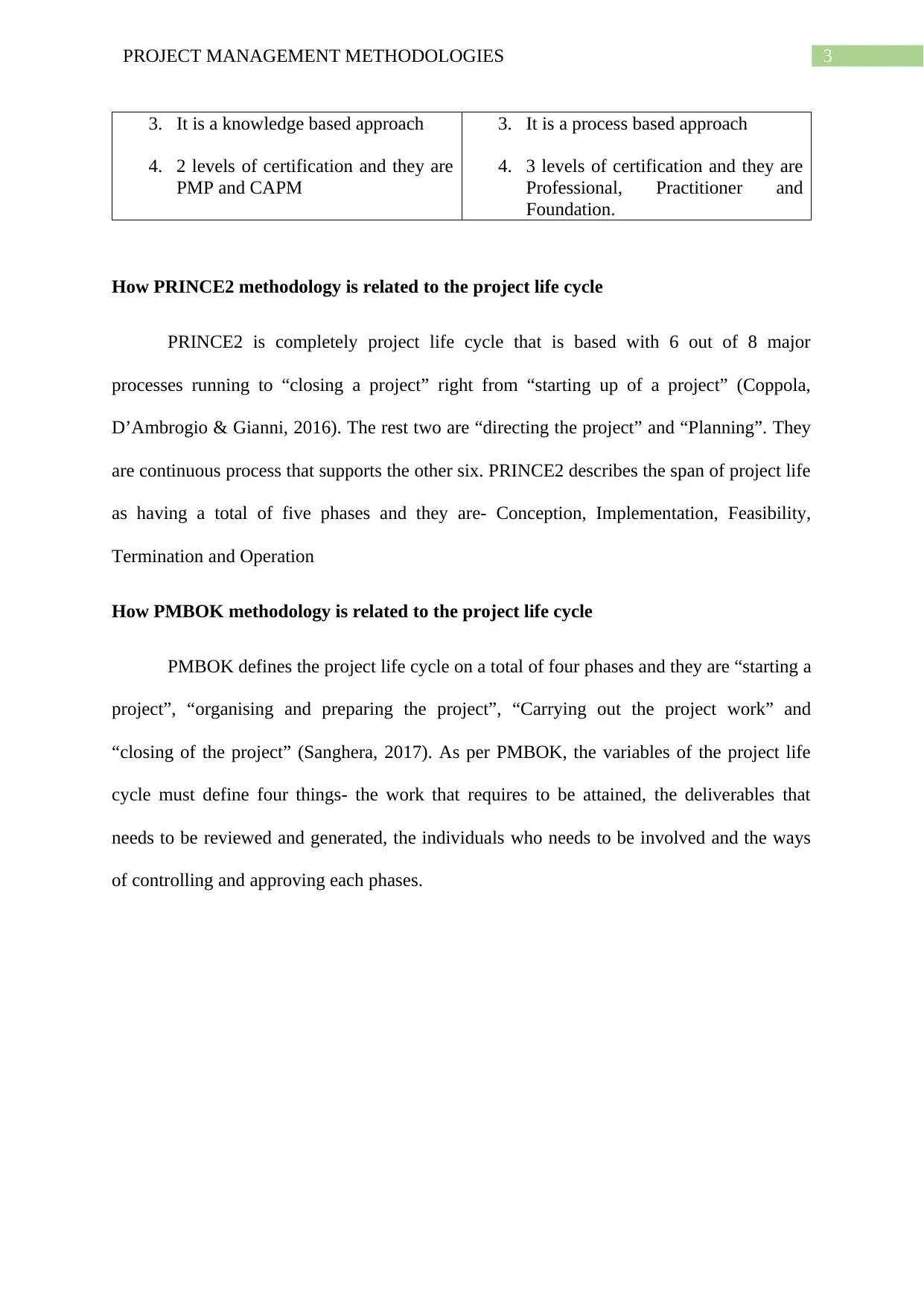
3PROJECT MANAGEMENT METHODOLOGIES
3. It is a knowledge based approach
4. 2 levels of certification and they are
PMP and CAPM
3. It is a process based approach
4. 3 levels of certification and they are
Professional, Practitioner and
Foundation.
How PRINCE2 methodology is related to the project life cycle
PRINCE2 is completely project life cycle that is based with 6 out of 8 major
processes running to “closing a project” right from “starting up of a project” (Coppola,
D’Ambrogio & Gianni, 2016). The rest two are “directing the project” and “Planning”. They
are continuous process that supports the other six. PRINCE2 describes the span of project life
as having a total of five phases and they are- Conception, Implementation, Feasibility,
Termination and Operation
How PMBOK methodology is related to the project life cycle
PMBOK defines the project life cycle on a total of four phases and they are “starting a
project”, “organising and preparing the project”, “Carrying out the project work” and
“closing of the project” (Sanghera, 2017). As per PMBOK, the variables of the project life
cycle must define four things- the work that requires to be attained, the deliverables that
needs to be reviewed and generated, the individuals who needs to be involved and the ways
of controlling and approving each phases.
3. It is a knowledge based approach
4. 2 levels of certification and they are
PMP and CAPM
3. It is a process based approach
4. 3 levels of certification and they are
Professional, Practitioner and
Foundation.
How PRINCE2 methodology is related to the project life cycle
PRINCE2 is completely project life cycle that is based with 6 out of 8 major
processes running to “closing a project” right from “starting up of a project” (Coppola,
D’Ambrogio & Gianni, 2016). The rest two are “directing the project” and “Planning”. They
are continuous process that supports the other six. PRINCE2 describes the span of project life
as having a total of five phases and they are- Conception, Implementation, Feasibility,
Termination and Operation
How PMBOK methodology is related to the project life cycle
PMBOK defines the project life cycle on a total of four phases and they are “starting a
project”, “organising and preparing the project”, “Carrying out the project work” and
“closing of the project” (Sanghera, 2017). As per PMBOK, the variables of the project life
cycle must define four things- the work that requires to be attained, the deliverables that
needs to be reviewed and generated, the individuals who needs to be involved and the ways
of controlling and approving each phases.
Paraphrase This Document
Need a fresh take? Get an instant paraphrase of this document with our AI Paraphraser
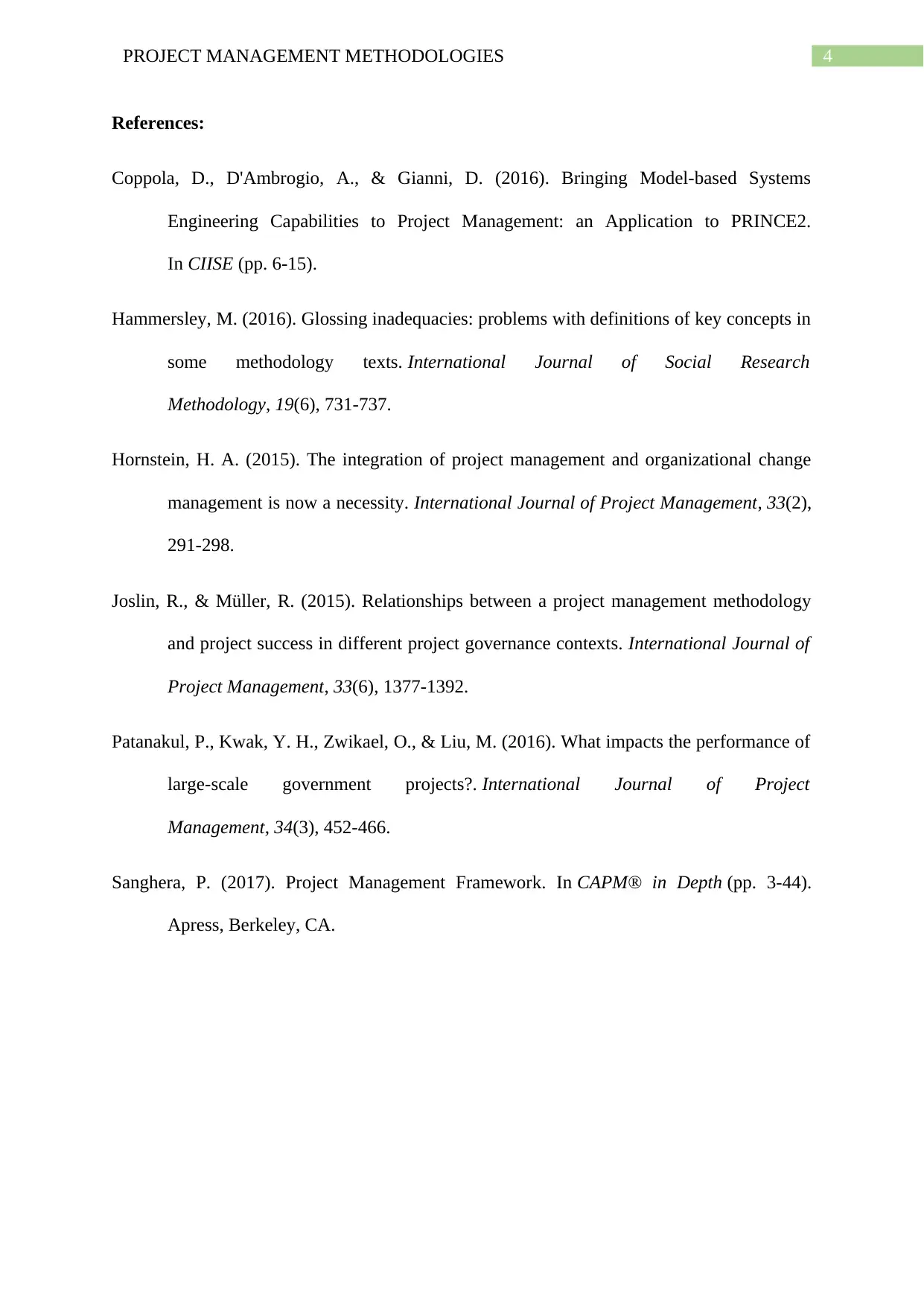
4PROJECT MANAGEMENT METHODOLOGIES
References:
Coppola, D., D'Ambrogio, A., & Gianni, D. (2016). Bringing Model-based Systems
Engineering Capabilities to Project Management: an Application to PRINCE2.
In CIISE (pp. 6-15).
Hammersley, M. (2016). Glossing inadequacies: problems with definitions of key concepts in
some methodology texts. International Journal of Social Research
Methodology, 19(6), 731-737.
Hornstein, H. A. (2015). The integration of project management and organizational change
management is now a necessity. International Journal of Project Management, 33(2),
291-298.
Joslin, R., & Müller, R. (2015). Relationships between a project management methodology
and project success in different project governance contexts. International Journal of
Project Management, 33(6), 1377-1392.
Patanakul, P., Kwak, Y. H., Zwikael, O., & Liu, M. (2016). What impacts the performance of
large-scale government projects?. International Journal of Project
Management, 34(3), 452-466.
Sanghera, P. (2017). Project Management Framework. In CAPM® in Depth (pp. 3-44).
Apress, Berkeley, CA.
References:
Coppola, D., D'Ambrogio, A., & Gianni, D. (2016). Bringing Model-based Systems
Engineering Capabilities to Project Management: an Application to PRINCE2.
In CIISE (pp. 6-15).
Hammersley, M. (2016). Glossing inadequacies: problems with definitions of key concepts in
some methodology texts. International Journal of Social Research
Methodology, 19(6), 731-737.
Hornstein, H. A. (2015). The integration of project management and organizational change
management is now a necessity. International Journal of Project Management, 33(2),
291-298.
Joslin, R., & Müller, R. (2015). Relationships between a project management methodology
and project success in different project governance contexts. International Journal of
Project Management, 33(6), 1377-1392.
Patanakul, P., Kwak, Y. H., Zwikael, O., & Liu, M. (2016). What impacts the performance of
large-scale government projects?. International Journal of Project
Management, 34(3), 452-466.
Sanghera, P. (2017). Project Management Framework. In CAPM® in Depth (pp. 3-44).
Apress, Berkeley, CA.
1 out of 5
Related Documents
Your All-in-One AI-Powered Toolkit for Academic Success.
+13062052269
info@desklib.com
Available 24*7 on WhatsApp / Email
![[object Object]](/_next/static/media/star-bottom.7253800d.svg)
Unlock your academic potential
Copyright © 2020–2026 A2Z Services. All Rights Reserved. Developed and managed by ZUCOL.



